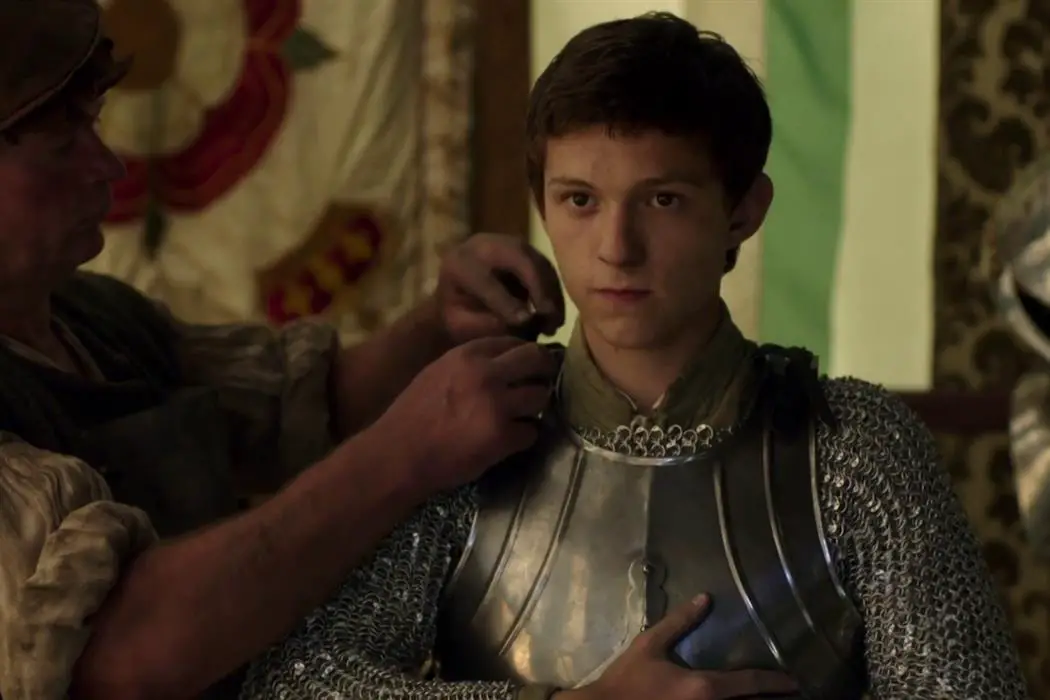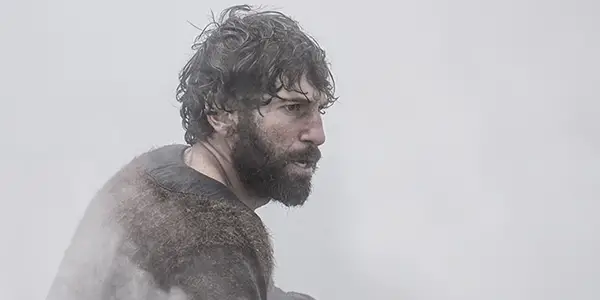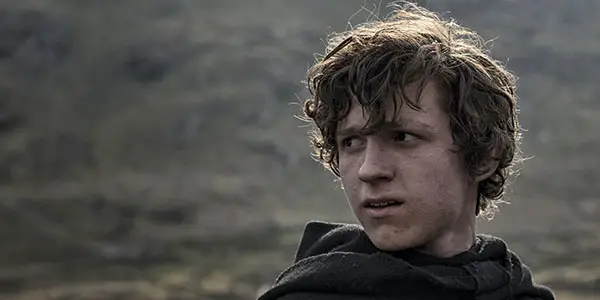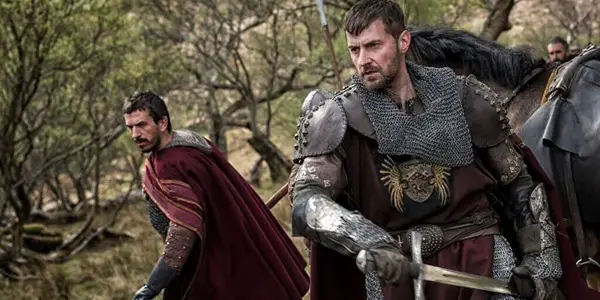PILGRIMAGE: A Juxtaposition Of Faith, Fear & Everything In Between

Ryan has a degree in Film & TV Production. He…
“How does a man without a voice confess his sins?”
That’s a question that gets asked in Brendan Muldowney‘s Pilgrimage. It’s a question that opens up a whole catalog of follow-up questions, but it’s also one that would sound best if never answered. When left to echo in the wind, it’s a question that invites speculation and depth and meaning but simultaneously seems to willingly turn away from all of them. Muldowney‘s film has the tone of one that should be an exact replica of the feeling this question gives off.
Unfortunately, it doesn’t quite succeed in doing this. That isn’t to say Pilgrimage is a poor film – on the contrary, I actually found a lot to like here – but it feels as if it’s holding back. It takes on the story of a group of Irish monks who are embarking on a pilgrimage to take an ancient and sacred relic to Rome; however, along the way, they encounter a rival clan who threaten to overthrow their journey, and the whole mission is plunged into violence, sacrifice and betrayal.

From its haunting monastery-styled music to its frequent shots of a moody sky, Pilgrimage has the look and style of a film that should almost be wordless: one that should be bold and minimize dialogue in favor of atmospheric storytelling. Perhaps it’s naive of me to long for such a thing from Pilgrimage – wordless storytelling is a difficult feat, after all. But cinema is seeing a small yet noticeable resurgence of purely visual storytelling lately, what with the triumphs of Mad Max: Fury Road and the more recent Dunkirk, and Pilgrimage just seemed to me to be the type of film to follow suit and push dialogue aside in favor of visual, atmospheric storytelling.
A Wordless Bernthal
It ultimately doesn’t do this, but it does give us one character who matches that description: the Mute, played sensationally by Jon Bernthal. It’s a feral, ferocious wordless performance, one that oozes confidence and character complexity. The Mute is a violent character, and he’s damn good with a sword, but Bernthal works to add a history to the wordless gimmick. Other characters are left to verbally fill in the blanks for us, but it’s Bernthal‘s character you come away remembering – perhaps further evidence that Pilgrimage‘s reliance on dialogue is one of its most misjudged elements.
Aside from Bernthal, the other performances are uniformly strong. Tom Holland (of recent Spider-Man fame) plays a young novice monk, and he brings an innocence and vulnerability to the otherwise bleak, dark film. Holland isn’t given as much to do as his talents would benefit from, but it’s a solid performance nonetheless.

Richard Armitage is also on hand as a Norman soldier – eventually taking on a kind of villain character as the narrative progresses – in a performance that works on an impressive number of levels. Raymond (Armitage‘s character) works to protect his own family even as he threatens to destroy the pilgrimage of the film’s protagonists, creating a moral conflict within him that Armitage handles deftly without ever overplaying his cards. Even amongst its rage, it’s an impressively nuanced performance.
From Faith to Fear
Pilgrimage takes on a dangerously high thematic weight very early on, but writer Jamie Hannigan‘s script balances his multitude of themes nicely. He allows them to blur into each other without sacrificing one for the other, bringing the film’s characters and their various motivations under the same thematic umbrella.
Pilgrimage is heavily focused on faith and our willingness to dedicate ourselves to something unanswered, but it also locates a fear within that, and soon begins to examine how this fear can drive us through our journeys. The film demonstrates this thematic blurring visually, too: a bloodied sword impaled in the ground, left to resemble a crucifix in a particularly stunning shot; a crucifix tattoo on the Mute’s back, surrounded by scars and old wounds.
As well as depicting the film’s themes through its cinematography and mise-en-scene, Muldowney pushes Pilgrimage down a violent path to reinforce this war between faith and fear. There’s a particularly brutal torture sequence in the middle act – one that’ll get your stomach churning at the very least – and Muldowney makes sure to keep the scene in close-up. He refuses to shy away from the brutality of the story and the era, giving his film a backbone that it would’ve perhaps been easy to skim over.

And this helps Pilgrimage a great deal, especially as it heads into its homestretch. The characters are beaten and worn down, their faith tested and their loyalty potentially damaged. Muldowney takes the camera into the mist for part of the final act, again visually demonstrating this shrouded faith and obscured loyalty. The film frequently suffers from an over-reliance on loud, overbearing music during moments that would favor subtlety, but even this is sidelined come the final act – it’s as if Muldowney suddenly realizes the potential his film has and launches it into a triumphant conclusion.
Pilgrimage: Conclusion
Still, even if most of Pilgrimage doesn’t feel like the film it should be, it remains enjoyable viewing. Well, enjoyable feels like the wrong word here. Pilgrimage isn’t an enjoyable film – it’s far too brutal and heavy for that, but it’s one that’s undeniably well-crafted and boasts a talented cast serving up reliably strong performances.
Muldowney is a director still in the early years of his career, but he brings a remarkable confidence to Pilgrimage, elevating it above its frequently overbearing dialogue and using his visual palette to create powerful symbolism that connects back into the script and the characters.
Pilgrimage may suffer from an uneven first two acts, but when it learns what kind of film it’s been trying to be all along, it’ll finally give you everything you’ve wanted from it.
Was Jon Bernthal’s performance the standout for you as well? Let us know in the comments!
Pilgrimage will be released on multiple VOD services on August 11th.
Does content like this matter to you?
Become a Member and support film journalism. Unlock access to all of Film Inquiry`s great articles. Join a community of like-minded readers who are passionate about cinema - get access to our private members Network, give back to independent filmmakers, and more.
Ryan has a degree in Film & TV Production. He has written about all things film and TV on his own blog, www.morrismovies.co.uk, for five years. His favourite film is Inception, as it's kind of the one that drew him into cinema in the first place. If you're one of those people who think Christopher Nolan is overrated, he probably doesn't like you. He isn't sorry.













